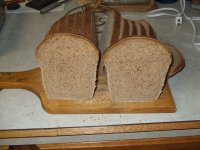Z-Michigan
Veteran Member
Hopefully this won't seem too weird for you. We recently got a small grain mill for home use, so we could have fresh ground grain with all its benefits, etc. Since we aren't farmers we need to buy some grain to use it. None of the local grocery stores seem to carry unground grain (big surprise). I know we can find stuff online, but it's usually fancy organic grain berries at $1/pound or more (plus shipping), when ground flour at the grocery store is around 33 cents/pound. It seems silly to pay two or three times more for unground grain as we would pay for the flour made from it!
We are in lower Michigan, a farming area where wheat (I believe it's mostly soft white winter wheat) is very common. There is a farmer's co-op just a few miles from us that is the major grain mill for local farmers to sell and/or store their harvests. They sell at retail and we regularly buy other stuff there, like horse feed. My wife asked them about buying some grain for our use; they have no problem selling small quantities and the price is right (around 16 cents/pound I think) but the person there thought it was weird that we would want to buy straight grain for our own eating, and seemed to imply it wasn't suitable for that. I am confused since I would think the grain they take in is going to market anyway and a large part of it will end up in human food, including the flour we buy at the grocery store!
So, who can tell me if the grain sold by the local co-op is likely or definitely safe for our consumption, after being ground by us? Or is it somehow treated with chemicals, or poorly stored, or whatever, so that it isn't safe for us to eat? I realize the grain they would have is straight from the field (via combine and grain bin), but are there any issues with that? How much cleaning would be needed and how easy or difficult is that cleaning?
As always, thanks in advance!
We are in lower Michigan, a farming area where wheat (I believe it's mostly soft white winter wheat) is very common. There is a farmer's co-op just a few miles from us that is the major grain mill for local farmers to sell and/or store their harvests. They sell at retail and we regularly buy other stuff there, like horse feed. My wife asked them about buying some grain for our use; they have no problem selling small quantities and the price is right (around 16 cents/pound I think) but the person there thought it was weird that we would want to buy straight grain for our own eating, and seemed to imply it wasn't suitable for that. I am confused since I would think the grain they take in is going to market anyway and a large part of it will end up in human food, including the flour we buy at the grocery store!
So, who can tell me if the grain sold by the local co-op is likely or definitely safe for our consumption, after being ground by us? Or is it somehow treated with chemicals, or poorly stored, or whatever, so that it isn't safe for us to eat? I realize the grain they would have is straight from the field (via combine and grain bin), but are there any issues with that? How much cleaning would be needed and how easy or difficult is that cleaning?
As always, thanks in advance!
